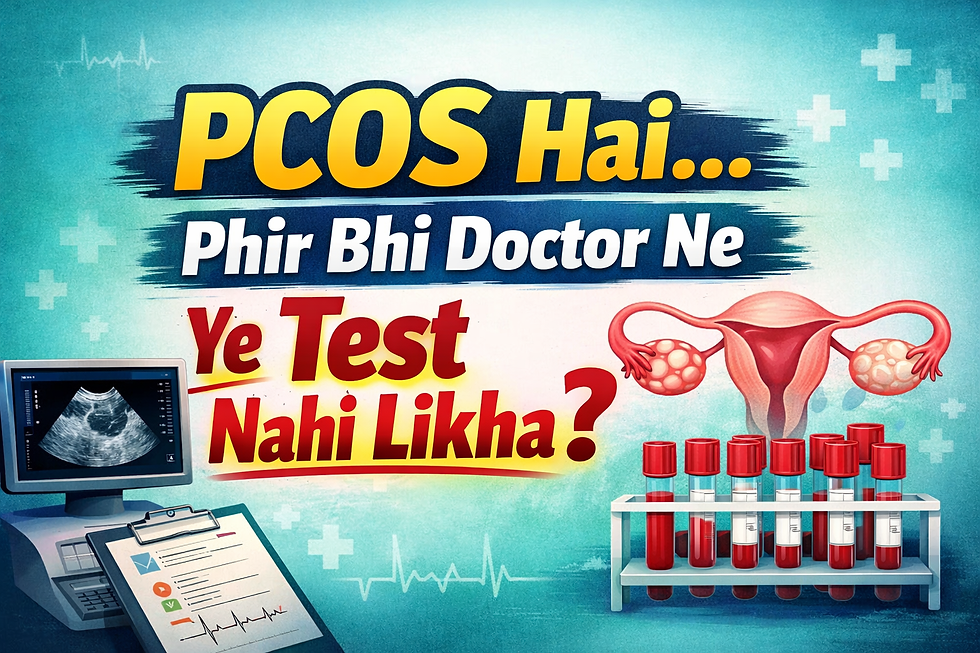
An Indian Diet for PCOS
- Chakrakosh
- Feb 5, 2025
- 2 min read
Dr Zeba Naaz
B. Sc, BAMS,
Hormonal & Metabolic HealthExpert
Certified yoga trainer
Nourishing Your Health Holistically
Polycystic Ovary Syndrome (PCOS) affects millions of women worldwide, causing a range of symptoms from hormonal imbalances to weight gain. While there is no one-size-fits-all solution, adopting an Indian diet can significantly help manage these symptoms. This blog explores how traditional Indian foods can support your journey toward better health.
Understanding PCOS
PCOS is characterized by hormonal imbalances that can lead to irregular menstrual cycles, weight gain, and increased levels of male hormones. Managing PCOS often involves lifestyle changes, including dietary adjustments. A well-balanced Indian diet can provide the nutrients needed to combat these challenges effectively.
Benefits of an Indian Diet for PCOS Rich in Fiber:
Traditional Indian meals are packed with vegetables, whole grains, and legumes, all of which are high in fiber. Fiber helps regulate blood sugar levels and supports digestive health, making it essential for managing insulin resistance associated with PCOS.
Low Glycemic Index (GI): Many Indian staples, such as lentils and whole grains, have a low GI. This means they release glucose slowly into the bloodstream, preventing insulin spikes and aiding in weight management.
Anti-Inflammatory Properties: Spices like turmeric, ginger, and cinnamon are commonly used in Indian cooking and possess anti-inflammatory properties that can help alleviate PCOS symptoms.
Nutrient-Dense Foods:
The diversity of the Indian diet ensures a wide range of nutrients. Incorporating fruits like amla (Indian gooseberry) and nuts such as almonds provides essential vitamins and healthy fats that support overall health.
Probiotics: Fermented foods like yogurt and dosa are staples in Indian cuisine. They promote gut health, which is crucial for hormone regulation.
Sample 7-Day Indian Diet Plan for PCOS

Foods to Avoid
To maximize the benefits of your diet, consider minimizing or avoiding:
Processed foods high in sugar
Refined carbohydrates (white bread, pastries)
Sugary beverages
Fried foods
Excessive dairy products
Conclusion
An Indian diet can be a powerful ally in managing PCOS symptoms. By focusing on whole foods rich in fiber and nutrients while avoiding processed options, you can take significant steps toward better health. Remember to consult a healthcare professional or nutritionist before making major dietary changes to ensure it aligns with your individual health needs.
Embrace the flavors of India while nurturing your body—your journey to wellness starts on your plate!
Disclaimer -
This information is educational and should not be construed as medical advice. Please consult your doctor before making any dietary changes or adding supplements.
Chakrakosh is a digital Ayurvedic clinic for your health care , offering accessible, personalised, and confidential healthcare solutions. We offer out-patient care, diagnostic services and programs for various health concerns , across their lifetime - from puberty to pregnancy to menopause. & from puberty to andropause.To know more on the sexual and reproductive health ,hormonal problems,Metabolic disorders, visit https://www.chakrakosh.com/




Comments